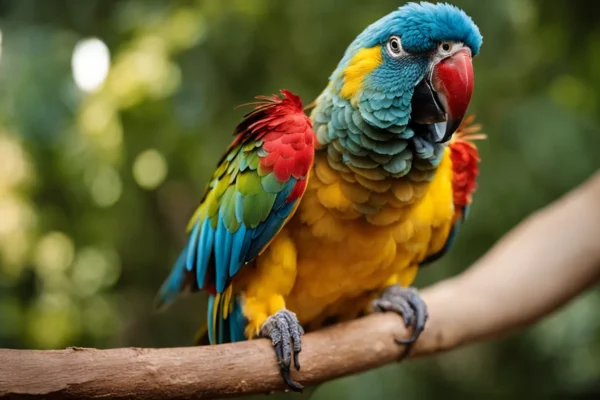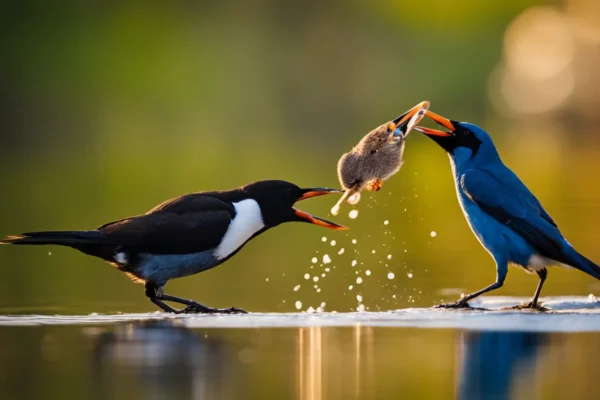You go to tremendous measures as a new parent to maintain your infant’s hygiene, health, and poop-free status. Eating your baby’s excrement is the last thing you should do! Therefore, it could come as a surprise to hear that a lot of bird species really eat the droppings of their young.
For those with limited time, the following is a brief response to your inquiry: Birds consume their young in order to maintain a clean nest and to introduce beneficial bacteria into their young, which improves immunity and digestion.
Nest Hygiene
A perplexing habit seen in birds is their propensity to consume the excrement of their young. Despite the fact that it can appear odd to humans, this behaviour is crucial to keeping the nest clean.
Stopping the Spread of Disease
Adult birds prevent infections from spreading among their offspring by eating their faeces. Vulnerable nestlings may be quickly infected by pathogenic germs and parasites found in bird droppings.
Parents improve the odds of their offspring’s survival and lower the danger of disease transfer by getting rid of the waste.
This behaviour is especially important in crowded nests, where there are many competing chicks for nutrients and space. Adult birds reduce the possibility of contamination and maintain a clean and healthy nest environment by eating the excrement.
Certain bird species have been identified by researchers to possess characteristics that facilitate the breakdown of faecal waste. For instance, certain species’ digestive systems generate enzymes that aid in the more effective breakdown of excrement, enabling them to obtain any leftover nutrients from the droppings of their chicks.
Getting Rid of Waste
Birds consume their young faeces as an effective way to get rid of waste. Keeping the environment clear of excessive detritus is crucial in the small space of a nest. Adult birds who eat the droppings not only maintain order in the nest but also lessen the possibility of drawing in predators that could be attracted to the smell of waste.
Adult birds may also recycle nutrients back into their own bodies by eating the faeces. This is particularly crucial during the taxing breeding season, when birds need to consume a lot of energy to take care of their young.
It’s important to remember that not all bird species behave in this way. Certain birds, like raptors, dispose of their excrement in unconventional ways, such transporting it outside of their nests. Various bird families and species exhibit distinct behavioural patterns and adaptations.
Realising the causes of this apparently odd behaviour brings to light the amazing adaptations that birds have developed over time to secure the survival of their progeny. Thus, keep in mind that birds consume their own excrement to keep their nests clean and to support the health of their young the next time you see one.
Beneficial Bacteria Feeding
Ever wonder why birds consume the excrement of their young? Though this behaviour can appear odd, there’s a valid rationale behind it. The primary purpose of birds eating their chicks’ poop is to nourish the good bacteria in their digestive tracts.
Facilitating Digestion
Birds may replenish their own digestive systems with essential nutrients and enzymes by eating the excrement of their young. Baby birds excrete what are called “faecal sacs,” which are pockets of undigested food high in protein and good bacteria.
These microorganisms are essential for assisting in food digestion and helping birds absorb as much nutrition as possible from their diet.
For birds, who have a high metabolic rate and must effectively extract energy from their meal, this particular behaviour is very significant. They are effectively recycling important nutrients and maximising their own energy intake by eating their infants’ excrement.
Increasing Immune Function
Eating the excrement of their chicks helps birds strengthen their immune systems in addition to facilitating digestion. Baby birds’ faecal sacs are filled with immunological components and antibodies that aid in warding off dangerous diseases.
Adult birds develop an additional line of defence against illnesses and infections by transferring part of their acquired immunity to their own bodies via the consumption of these immune-boosting foods. This is especially crucial when their children’s immune systems are still growing, which is a sensitive time in their development.
Studies have shown that this conduct is not exclusive to birds. Additionally, certain animals, including rats and rabbits, practise coprophagy, or eating excrement. It accomplishes comparable goals by strengthening the immune system and facilitating digestion.
Thus, the next time you see a bird feeding its young, keep in mind that this is not an odd behaviour but rather a normal and advantageous habit that supports the bird’s immune system and helps it maintain a healthy digestive tract.
Recycling of Nutrients
Ever wonder why birds consume the excrement of their young? Though this behaviour can appear odd, there’s a valid rationale behind it. Birds recycle nutrients by reabsorbing vital vitamins and minerals from the waste products of their nestlings.
Minerals and vitamins that are reabsorbed
Birds may recover important nutrients lost during digestion when they consume the excrement of their young. Nestling excrement often contains a large quantity of partially digested food that may still include a considerable number of vitamins and minerals.
Adult birds are able to obtain the residual nutrients and make sure they are not squandered by eating this trash.
For birds who have limited access to food or are rearing their young in places where food is sparse, this nutrient recycling mechanism is very crucial. Adult birds may preserve their own health and provide the nutrition their young need by reabsorbing these vital elements.
Preservation of Resources
One further reason why birds consume the excrement of their young is to save resources. The growing digestive systems of nestlings are less effective than those of mature birds. This indicates that they often are unable to absorb every nutrition from their meals.
These residual nutrients may be used by adult birds, keeping them from going to waste, by eating the excrement produced by their younglings.
Moreover, birds, particularly in the mating season, have limited energy and time to gather food. They may save energy and lessen the need to look for other food sources if they recycle the nutrients from their infants’ faeces.
By doing this, the adult birds are guaranteed to have more time and energy to devote to raising their young and improving their prospects of survival.
Even though it may sound strange, birds are very resourceful and efficient, as seen by the amazing example of them eating their own offspring’ excrement. Thus, keep in mind that birds are only attempting to maximise the resources at their disposal the next time you see them doing this behaviour.
Stimulation of Hormones
Hormonal stimulation may be one explanation for why birds consume the excrement of their young. A bird’s body experiences profound hormonal changes when it becomes a parent. The eating of their offspring’s excrement is one of the behaviours that is brought on by these alterations.
Setting Off Feeding
The primary purpose of birds eating their young is to encourage feeding. Birds learn to recognise undigested food particles by eating the excrement of their young. This aids them in determining if their chicks are receiving enough nourishment or whether their feeding schedules need to be modified.
The parent birds use it as a means of keeping an eye on the growth and well-being of their young.
Particularly prevalent in bird species that regurgitate food for their young is this behaviour. They can tell whether their chicks are getting enough nutrients by eating their infants’ excrement, and if not, they may feed them more to guarantee their survival and further development.
Encouraging Development
To encourage development is another reason why birds consume the excrement of their young. Young birds excrete a lot of good bacteria that help with digesting. Parent birds may get these good bacteria by eating the excrement of their young and then regurgitate or feed them directly to their young.
By aiding in the more effective digestion of food, these bacteria enable the chicks to absorb more nutrients from their diet. Better growth and development are encouraged by this, which eventually raises their chances of survival.
It’s crucial to remember that not every type of bird demonstrates this behaviour. It is more often seen in animals whose young are primarily fed via regurgitation. Every species of bird has developed special adaptations and behaviours to secure the survival of their progeny.
Final Thoughts
Even though the idea of eating excrement makes us queasy, there are valid reasons why birds sample the excrement of their young. Bird parents employ a unique but successful method to rearing healthy chicks: they keep the nest clean, populate intestinal microbes, recycle nutrients, and stimulate their young.





![Why Are Geese Aggressive? [Be Cautious]](https://birdsology.com/wp-content/uploads/2023/09/3505443489_a7046c5374_z-600x400.jpg.webp)
